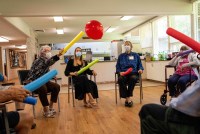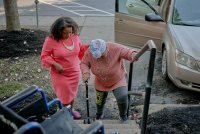Latest KFF Health News Stories
Nuevas alternativas para resolver la crisis del cuidado de salud en casa
El cuidado en el hogar ya es una de las ocupaciones de más rápido crecimiento en el país: el año pasado había 3,2 millones de asistentes de salud en el hogar y de cuidado personal, frente a 1,4 millones una década atrás.
Solving the Home Care Quandary
Paid home care is buckling under the surging demands of an aging population. But there are alternatives that could upgrade jobs and improve patient care.
Cada vez más personas cuidan en casa a familiares que agonizan. Una organización enseña cómo hacerlo
La demanda de atención médica en casa, incluyendo los cuidados paliativos domiciliarios, se ha disparado desde el inicio de la pandemia de covid, al igual que el número de personas que cuidan a familiares.
Gobierno prometió “transparencia radical”, pero oculta solicitudes de fondos para la salud rural
Drones que entregan medicamentos y telesalud en bibliotecas locales son algunas de las ideas que líderes estatales acaban de presentar para gastar su parte de un programa federal de salud rural de $50.000 millones.
Feds Promised ‘Radical Transparency’ but Are Withholding Rural Health Fund Applications
Proposals from states that have shared their applications to a new $50 billion rural health program include using drones to deliver medication, installing refrigerators to expand access to healthy produce, and bringing telehealth to libraries, day cares, and senior centers.
More People Are Caring for Dying Loved Ones at Home. A New Orleans Nonprofit Is Showing Them How.
Demand for home health care, including at-home hospice care, has skyrocketed since the onset of the covid pandemic. A New Orleans nonprofit is teaching people how to provide end-of-life care for relatives and community members.
An Age-Old Fear Grows More Common: ‘I’m Going To Die Alone’
As families fracture, people are living longer and are more likely to find themselves without close relatives or friends at the end of their lives.
Californians Receiving In-Home Care Fear Medicaid Cuts Will Spell End to Independent Living
Bay Area senior Carol Crooks doesn’t know where congressional Republicans will land on Medicaid cuts as they look to fund a tax bill, but her health has already deteriorated as she worries about losing the help she needs to remain in her Oakland apartment — and out of a nursing home.
Immigration Crackdowns Disrupt the Caregiving Industry. Families Pay the Price.
Families, nursing facilities, and home health agencies rely on foreign-born workers to fill health care jobs that are demanding and do not attract enough American citizens. The Trump administration’s anti-immigration policies threaten to cut a key source of labor for the industry, which was already predicting a surge in demand.
Redadas contra inmigrantes afectan a la industria del cuidado. Las familias pagan el precio.
Los estadounidenses dependen de muchos trabajadores nacidos en el extranjero para cuidar a sus familiares mayores, lesionados o discapacitados que no pueden valerse por sí mismos.
Resources Are Expanding for Older Adults on Their Own
Aging alone, without a spouse, a partner, or children, requires careful planning. New programs for this growing population offer much-needed help.
Expanden los recursos para las personas mayores que viven solas
Todos estos recursos abordan la necesidad de estos adultos mayores de relacionarse con otras personas, evitar el aislamiento y prepararse para un futuro en el que podrían tener menos energía, más problemas de salud y necesitar más ayuda.
Homebound Seniors Living Alone Often Slip Through Health System’s Cracks
There is a large population of older adults with physical problems that prevent them from leaving home. Many have significant medical and practical needs that go unmet.
Watchdog Calls for Tighter Scrutiny of Medicare Advantage Home Visits
Medicare officials defend the use of home visits that often spot medical conditions that are never treated.
What the Health? From KFF Health News: The Campaign’s Final Days
It’s the final days of the 2024 campaign, and Republicans are suddenly talking again about making changes to the Affordable Care Act if former President Donald Trump wins. Meanwhile, new reporting uncovers more maternal deaths under state abortion bans — and a case in which a Nevada woman was jailed after a miscarriage. Lauren Weber of The Washington Post, Shefali Luthra of The 19th, and Jessie Hellmann of CQ Roll Call join KFF Health News’ Emmarie Huetteman to discuss these stories and more. Also this week, KFF Health News’ Julie Rovner interviews Irving Washington, a senior vice president at KFF and the executive director of its Health Misinformation and Trust Initiative.
What to Know About Home Care Services
Finding an aide to help an older person stay at home safely takes work. Here’s a guide.
Desperate Families Search for Affordable Home Care
Facing a severe shortage of aides and high costs, people trying to keep aging loved ones at home often cobble together a patchwork of family and friends to help.
Facing Financial Ruin as Costs Soar for Elder Care
The United States has no coherent system of long-term care, leading many to struggle to stay independent or rely on a patchwork of solutions.
¿Será tu celular tu próximo consultorio médico?
La yema del dedo presionada contra la lente de la cámara de un celular puede medir la frecuencia cardíaca. El micrófono, colocado junto a la cama, puede detectar apnea del sueño. Incluso el altavoz está siendo modificado para monitorear la respiración usando tecnología de sondas.
Will Your Smartphone Be the Next Doctor’s Office?
Entrepreneurs see smartphones as an opportunity to meet patients where they are. But many app-based diagnostic tools still need clinical validation to get buy-in from health care providers.





















